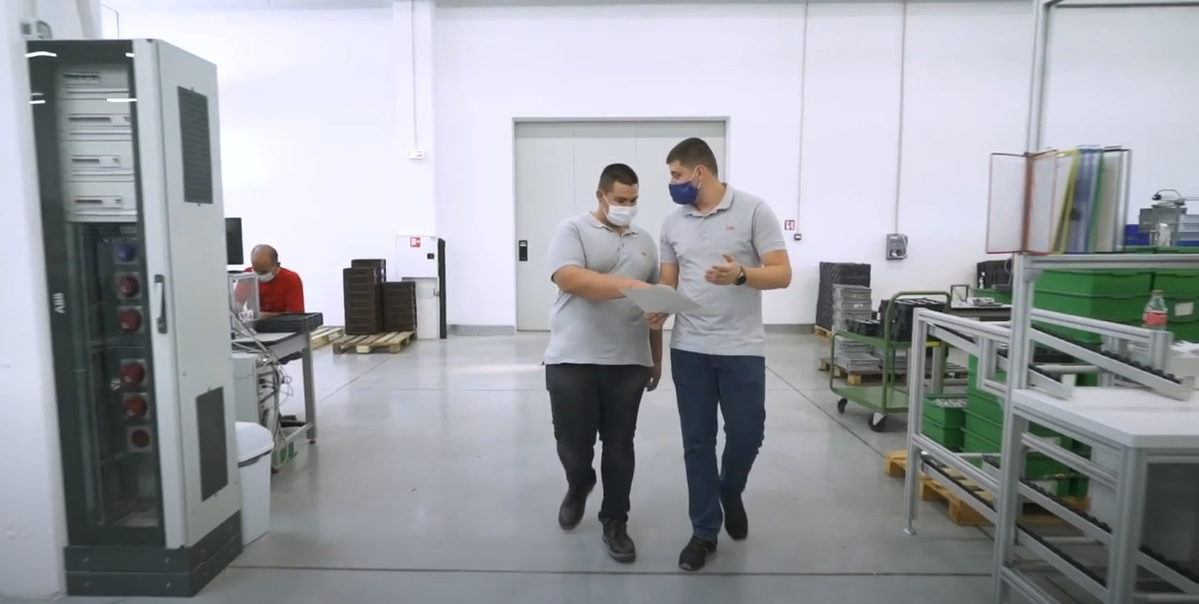Federal Environment Minister Svenja Schulze honours the best Energy Scouts of the year
They use solar energy for power supply, install efficient compressed air nozzles, optimise lighting and have a common goal: saving CO₂ through practical measures in their company.
Nearly 10,000 Energy Scouts in Bulgaria, the Czech Republic, Germany, Greece and Hungary are looking for energy saving opportunities in their companies. They were honoured for their outstanding work on 28 October by Federal Environment Minister Svenja Schulze and the President of the Association of German Chambers of Commerce and Industry Dr. Eric Schweitzer.

Federal Environment Minister Svenja Schulze: “The energy scouts are a good example of how experiences in national climate action can also be exchanged and further developed with European neighbours. The growing number of energy scouts is an important signal for more climate protection in companies and municipalities, in Germany and in Europe”. Every year several hundred teams compete for the title of “Energy Scout of the Year”. The best of them met virtually for the first time in 2020 for an online event. The winners of 2020 are:
Bulgaria: Ivan Lazarov and Atanas Milev from ABB Bulgaria EOOD’s Petrich branch
With their project for the construction of a 30 kWp photovoltaic system for internal consumption, they achieve annual savings of 37,702 kWh electricity and 30 tons of CO₂ emissions.
Greece: Adam Balampanis and Panagiotis Kapelios from TrainOSE
Their project includes switching to LED lighting, upgrading the compressed air circuit and reducing energy required for heating by integrating pre-heated air into the system.
Czech Republic: Jan Bílek from Preol, a. s.
In his project, he uses waste heat from condensate in the production process for heating and hot water generation in the administration building. This way, the annually required amount of pulverised lignite decreases by 405 MWh. The savings in CO₂ emissions amount up to 147 tons per year.
Hungary: Ágnes Sebestyén, István Csordás, István Sipos and Ferenc Németh from DENSO Manufacturing Hungary Ltd.
As part of their compressed air project, they installed nozzles and optimized a drill grinder. The measures lead to annual savings of 1,781 MWh electricity and 408 tons of CO₂ emissions with an amortization period of only 0.27 years.
Germany:
Category Small Companies: Julia Philipps and Phil Beckord from winklerswurst GmbH & Co. KG in Rheda-Wiedenbrück
By switching to a polystyrene-free shipping material, they save more than 46 tons of CO₂ emissions and over 8,600 EUR per year.
Category Medium-Sized Companies: Aaron Gessner and Erik Schmitt from Joyson Safety Systems PlasTec GmbH in Bad Kissingen
They developed a mechanical filling device for plastic granulate to replace the compressed air-controlled system. This leads to annual savings of approximately 71 tons of CO₂ emissions and 21,000 EUR.
Category Large Companies: Sophia Carolina Lindner, Servet Anar and Nicholas Lehmann from H. & J. Brüggen KG in Lübeck
The team reduced water consumption by 5,733 m³ by using a high-pressure cleaner with a rotary lance. At the same time, the need for gas to heat the water for cleaning is reduced, saving an additional 75 tons of CO₂ emissions per year.

With the project Young Energy Europe, the Federal Ministry for the Environment, Nature Conservation and Nuclear Safety supports the qualification of European Energy Scouts within the European Climate Initiative. The project is implemented by the German Chambers of Commerce and Industry in Bulgaria, Greece, the Czech Republic and Hungary in cooperation with the Association of German Chambers of Commerce and Industry (DIHK for its acronym in German).
The German Energy Scouts are funded by the National Climate Protection Initiative of the Ministry through the German SME Initiative Energiewende and Climate Protection. The SME Initiative is supported by four partners: The Federal Ministry for the Environment, Nature Conservation and Nuclear Safety, the Federal Ministry for Economic Affairs and Energy, the DIHK and the German Confederation of Skilled Crafts (ZDH for its acronym in German).
Financed by the National Climate Protection Initiative of the Federal Environment Ministry and the Energy Efficiency Fund of the Federal Ministry for Economic Affairs, the Initiative launches projects and events throughout Germany.
tries.

